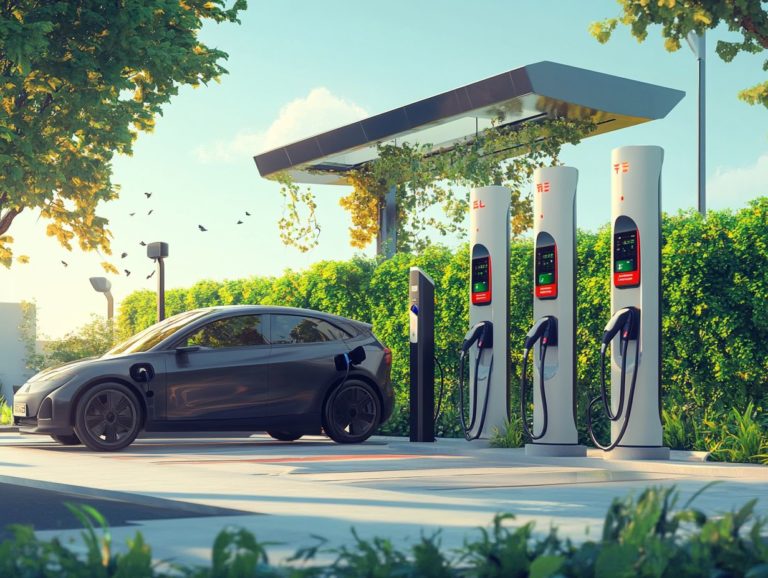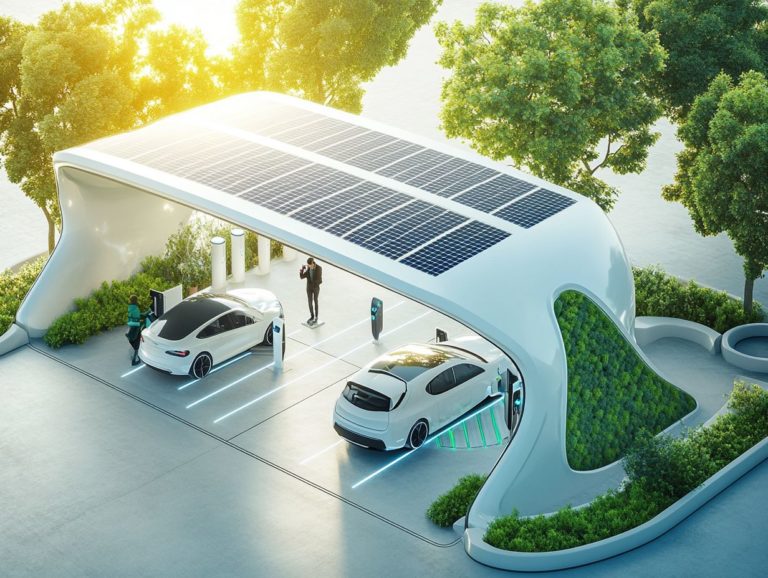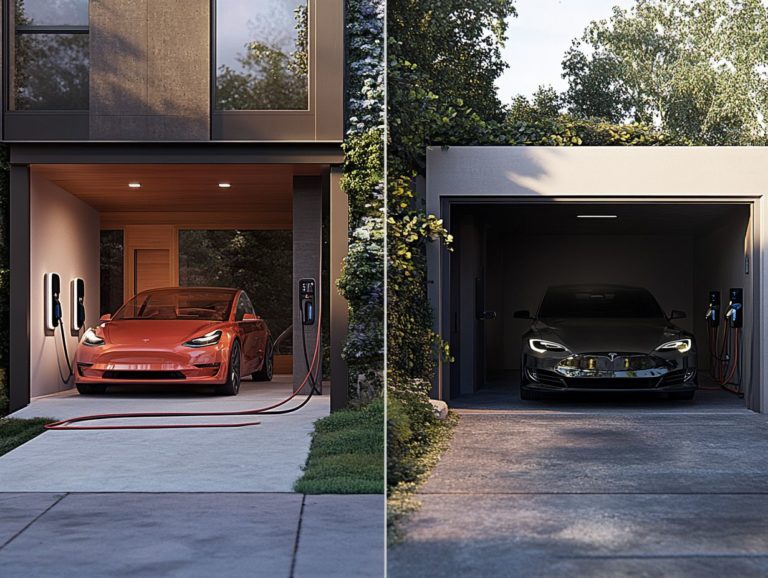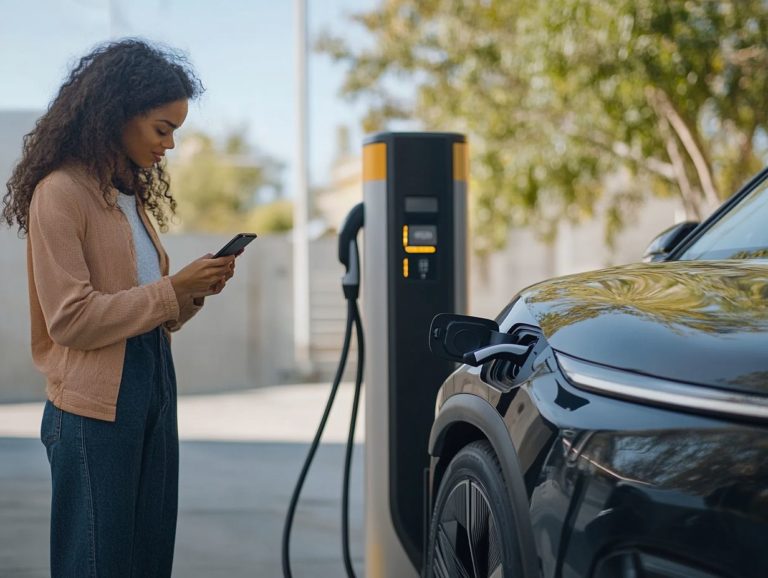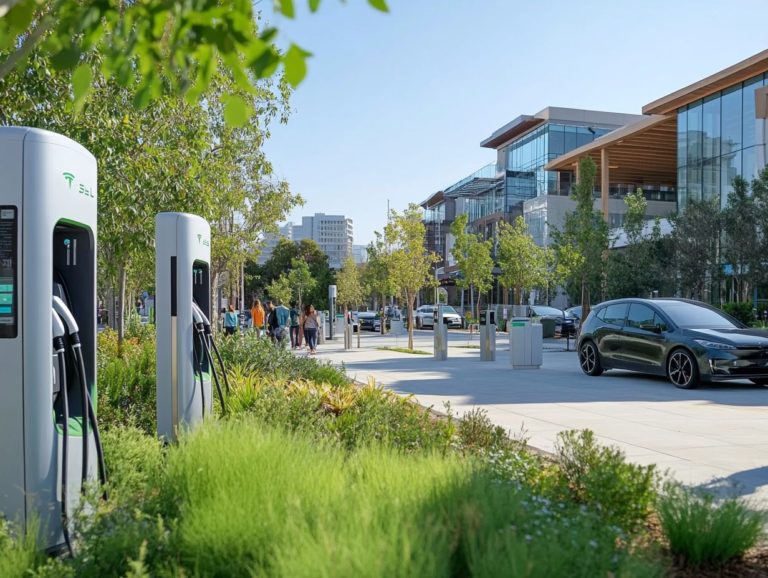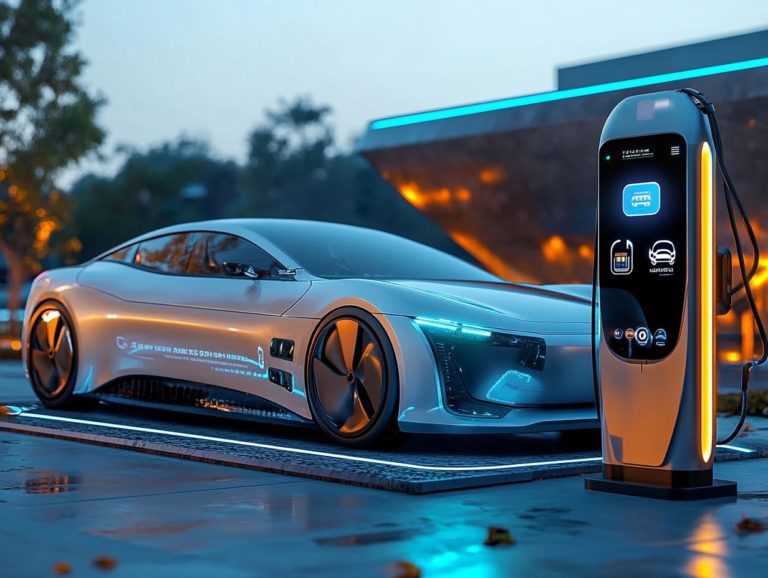The Future of EV Charging in Smart Homes
As electric vehicles (EVs) gain traction, integrating EV charging into your smart home is more relevant than ever.
This article explores the numerous benefits of having dedicated charging solutions at home: from convenience and cost savings to the positive environmental impact you can create.
You’ll learn about the state of charging technologies, adoption rates, and the challenges that homeowners may face.
We’ll look at what the future holds, including advancements that could revolutionize home energy management.
Are you ready to transform your home into a smart EV charging hub? Let’s get started!
Contents
- Key Takeaways:
- Benefits of EV Charging in Smart Homes
- Current State of EV Charging in Smart Homes
- The Future of EV Charging in Smart Homes
- How to Prepare Your Home for EV Charging
- Frequently Asked Questions
- What is the future of EV charging in smart homes?
- How will smart homes impact the EV charging industry?
- What technologies will be used for EV charging in smart homes?
- Will smart homes be able to handle the energy demand of EV charging?
- How will smart homes benefit both EV owners and the environment?
- What role will smart grids play in the future of EV charging in smart homes?
Key Takeaways:
- EV charging in smart homes offers convenience and cost savings for electric vehicle owners, along with a positive environmental impact.
- The current state of EV charging includes various technologies and infrastructure but faces challenges in adoption rates.
- The future of EV charging is expected to bring innovations that impact both the energy grid and home automation systems.
What is EV Charging in Smart Homes?
EV charging in smart homes means integrating electric vehicle (EV) charging solutions into your smart home ecosystem. With advanced technologies, you can optimize energy usage and cater to your preferences.
These systems streamline the charging process for your electric vehicle and contribute to effective energy management and sustainability through smart devices, voice control, and automation.
By utilizing systems to manage your home’s energy, you can monitor and control your energy consumption. This ensures that your EV charging aligns with peak and off-peak energy pricing, helping you save on utility costs and maximize the use of renewable energy sources.
Smart home technologies, like real-time energy monitoring apps, allow you to adjust your charging schedules based on your habits. These innovative systems facilitate a smooth transition to greener energy alternatives, supporting a modern lifestyle that prioritizes efficiency.
Benefits of EV Charging in Smart Homes
The advantages of EV charging in smart homes are numerous, offering a blend of convenience, cost management, energy efficiency, and a positive impact on the environment.
This integration is vital in contemporary living. With smart home technologies, you can optimize both the timing and locations for charging, enhancing your experience with electric vehicles.
Convenience and Cost Savings
Incorporating EV charging into your smart home offers two significant perks: convenience and cost savings.
With mobile apps for remote monitoring and scheduling, you can manage your charging behavior, allowing you to capitalize on off-peak periods and reduce energy costs.
This strategic approach can lead to impressive savings on your energy bills. Modern charging stations often come equipped with smart technology, enabling you to set charging times and monitor usage patterns through intuitive interfaces.
Devices like smart thermostats can optimize your energy use by syncing EV charging with other high-energy activities. Applications like ChargePoint help you locate nearby charging stations and choose spots based on real-time pricing data.
Environmental Impact
The environmental impact of EV charging in smart homes is significant. It promotes sustainability through the seamless integration of renewable energy sources while enhancing the efficiency of a network managing electricity supply and demand.
Charging your EV during off-peak hours, when renewable energy resources are abundant, amplifies these environmental benefits. Smart technologies allow you to harness this energy efficiently, contributing to grid stability and promoting investments in green energy initiatives.
Incorporating energy management systems leads to lower energy costs and supports a collective movement toward a cleaner, more resilient energy future.
Current State of EV Charging in Smart Homes
The current state of EV charging in smart homes is rapidly evolving, filled with various technologies and infrastructure options. However, adoption rates and challenges persist.
Industry leaders like Schneider Electric and Ford drive innovations in smart home EV chargers, integrating these devices with energy management systems to elevate the overall user experience.
Available Technologies and Infrastructure
The landscape of EV charging in smart homes is promising, offering advanced devices and infrastructure designed to enhance your charging experience. For example, Schneider Electric’s EVlink Home Smart charger shows how smart home ecosystems can connect seamlessly with EV capabilities.
Smart home energy management platforms use analytics and real-time monitoring to distribute energy resources intelligently. These systems prioritize charging times based on electricity rates, allowing you to save money while ensuring your vehicle is always ready.
Incorporating solar charging solutions maximizes renewable energy use, significantly reducing your carbon footprint and providing sustainable options.
Adoption Rates and Challenges
Adoption rates for EV charging in smart homes are rising, but challenges may impede widespread integration. Factors such as user demand, installation costs, and necessary partnerships among manufacturers play pivotal roles.
As households focus on sustainability, interest in electric vehicles grows. However, potential adopters often grapple with uncertainties surrounding installation costs and compatibility with existing systems.
Strategic collaborations between technology firms, utility providers, and automotive companies can pave the way for efficient solutions, enhancing customer convenience and sparking innovation.
The Future of EV Charging in Smart Homes
The future of EV charging in smart homes holds great promise. Anticipated advancements are set to revolutionize energy management and the integration of electric vehicles.
As technology evolves, expect enhanced automation features and improved energy optimization impacting both the energy grid and your home systems.
Predicted Advancements and Innovations
Predicted advancements in EV charging are set to elevate your experience with electric vehicles. Enhanced smart home technologies will refine energy management, including improved integration with smart grids and advanced mobile apps.
Features like bi-directional charging, which allows your electric vehicle to act as an energy storage unit, will enable you to feed power back into your home or the grid during peak demand.
This innovation not only cuts costs but also strengthens a responsive energy system, contributing to the growth of sustainable smart communities.
Impact on Energy Grid and Home Automation
EV charging significantly impacts the energy grid and home automation. It presents opportunities for demand response and energy optimization in your smart home.
This evolution facilitates the integration of renewable energy sources while regulating peak load times to ensure grid stability. By utilizing smart charging technologies, you can gather real-time data to adjust your consumption patterns.
How to Prepare Your Home for EV Charging
Get your home ready for EV charging with a few thoughtful upgrades. Evaluate your existing electrical systems and consider incorporating smart devices that enhance the EV charging experience.
Considerations and Necessary Upgrades
When preparing for EV charging, prioritize safe and efficient operation. Focus on installing proper overload protection and ensuring your energy management systems can handle increased usage.
Evaluate your wiring and circuit capabilities, especially in older homes. You may need rewiring or new circuit breakers to manage the electrical load effectively. Installing a dedicated circuit for your EV charger enhances safety.
Embracing smart charging solutions will improve your energy management, allowing for demand response and peak load-shifting. These proactive steps protect the charging process and promote a sustainable living environment.
Frequently Asked Questions
What is the future of EV charging in smart homes?
The future of EV charging in smart homes looks bright! Expect full integration and automation for a hassle-free experience.
How will smart homes impact the EV charging industry?
Smart homes will greatly impact the EV charging industry by making it more convenient and accessible for EV owners to charge their vehicles at home, increasing demand for EVs.
What technologies will be used for EV charging in smart homes?
Technologies such as wireless charging, smart energy management systems, and vehicle-to-grid (V2G) integration will be used for EV charging, making it seamless and efficient.
Will smart homes be able to handle the energy demand of EV charging?
Yes, smart homes are equipped with advanced energy management systems. These systems can handle the energy demand of EV charging without straining the home’s supply.
How will smart homes benefit both EV owners and the environment?
Smart homes offer EV owners a convenient and affordable way to charge their vehicles, helping to lower their environmental impact.
What role will smart grids play in the future of EV charging in smart homes?
Smart grids are essential for the future of EV charging by providing stable energy for charging and promoting renewable energy use. They enable two-way communication between the EV and the grid for efficient energy management.
Ready to take the next steps? Start integrating EV charging into your smart home today for a more efficient and sustainable future!

.jpg_00.jpeg)
.jpg_01.jpeg)
.jpg_10.jpeg)
.jpg_11.jpeg)
